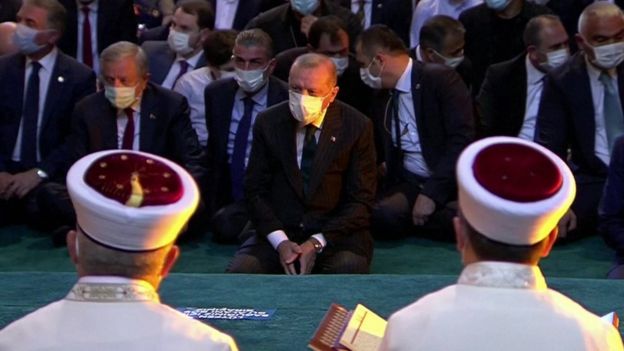www.aljazeerah.info
Opinion Editorials, July 2020
Archives
Mission & Name
Conflict Terminology
Editorials
Gaza Holocaust
Gulf War
Isdood
Islam
News
News Photos
Opinion Editorials
US Foreign Policy (Dr. El-Najjar's Articles)
www.aljazeerah.info
Two Contrasting Pictures from Today's Turkey By Serkan Demirtas Hurriyet, July 26, 2020 |
 |
 |
|
| Turkey's president, Erdogan, joined several senior ministers for the start of the Friday prayer at Hagia Sophia, July 24, 2020 bbc |
July 24 has always marked a very important day in Turkish history. On that day in 1923, Turkey signed the Lausanne Peace Treaty with a number of world powers, including the British Empire,
France, Italy and Greece, officially ending the Independence War and annulling the infamous Sèvres Treaty.
Among many others, the Lausanne Treaty has significance for two main reasons: First, it’s a peace treaty that established a state of peace with the aforementioned countries and secured Turkey’s territorial unity after years of war. As a result of the treaty, the new Turkish administration under the leadership of Mustafa Kemal Atatürk built a new and more equal relationship with the European powers as the historic document guaranteed its full political and economic sovereignty.
Second, the Lausanne Treaty paved the way for the foundation of the Republic of Turkey according to a vision carefully crafted by Atatürk. The new republic was designed to be a respected member of the contemporary world by embracing universal values, reforming the entire administrative structure and adopting a revolutionary approach when it came to adopting the Latin alphabet, granting rights to women and implementing a secular order.
That’s why the treaty has long been described as the title deed of the Republic of Turkey and a clear victory for Atatürk and his right-hand man, İsmet İnönü.
However, starting from this year, July 24 will be marked by another occasion as well. After 86 years, on July 24, the Byzantine-era cathedral Hagia Sophia was opened to Islamic worship in a massive ceremony with the participation of President Recep Tayyip Erdoğan and his main ally, Nationalist Movement Party (MHP) leader Devlet Bahçeli.
Thousands of people, including members of various religious sects, flocked to Istanbul’s Old City to attend the Friday Prayer and rejoiced over the first prayers.
Whether a coincidence or not, the fact that the first prayers at Hagia Sophia took place on the 97th anniversary of the Lausanne Treaty illustrates a very contrasting picture of today’s Turkey.
At the same hours as crowds were gathering outside Hagia Sophia, representatives of various nongovernmental organizations wanted to mark the anniversary of the treaty in some cities, including Ankara and İzmir.
In Ankara, a group of NGOs were denied permission to visit Atatürk’s Mausoleum on the grounds that Anıtkabir was in the process of disinfestation due to COVID-19. The group only managed to enter Anıtkabir after an intervention from Republican People’s Party (CHP) lawmakers. In İzmir, the governor banned the celebrations of the Lausanne Treaty on the grounds that they could lead to societal division and unrest.
However, that did not stop millions of social media users from conveying their respects to Atatürk and the founders of the modern republic and underlining the importance of the basic principles of modern Turkey.
Today’s Turkey, unfortunately, displays two pictures in full contrast to each other: On the one, a growingly nationalist-conservative trend and on the other, a pro-democracy, secular and modernist trend.
While the former hails the reopening of Hagia Sophia as a mosque, the latter makes clear Atatürk and his revolutions will not fade away.
***
Share the link of this article with your facebook friends
|
|
|
|
||
|
||||||


